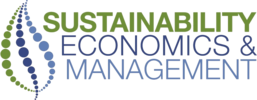Rahmenbedingungen:
Dauer: 1 Semester
Turnus: jährlich,
Lern-/Lehrform: 4 SWS
Lehrsprache: Deutsch/Englisch
ECTS-Kredit-Punkte: 6,00
Workload: 180 Stunden, davon Präsenzzeit: 56 Stunden
Modulinhalte:
The module "Strategic Sustainability Management" provides an overview of the debates on the role of firms for sustainable development from a strategic perspective. The first session will briefly introduce the historical debate on Corporate Sustainability and Corporate Social Responsibility and delineate important concepts. The following sessions will use concrete company case studies as a basis for a critical discussion of questions in the context of corporate sustainability that are of strategic importance for firms. Questions that will be discussed are, amongst others:
- How can one determine whether a firm acts in a socially and ecologically sustainable way?
- Which factors drive and hinder the diffusion of socially and ecologically superior solutions and companies in the market?
- To which extent is there a conflict between firm and market growth on the one hand and sustainability on the other hand?
- Which possibilities does a company have to deal with conflicts between social/ecological and economic goals?
- How can existing firms and value chains be transformed toward sustainability?
- What is the role of managers and boards of directors for organizational change toward sustainability?
- How does the ownership and financial structure of firms influence their strategy toward sustainability?
- In how far can cooperation and partnerships between organizations help integrate social and ecological aspects in 53 firms?
In addition to discussing these questions by drawing on company case studies, students will be introduced to the corresponding theoretical concepts and frameworks in the academic literature. Also, students will be given the opportunity to test different strategies for implementing sustainability in organizations during a simulation, which allows them to gain first-hand insights into the emerging challenges. Toward the end of the course, students will apply and deepen the knowledge they have gathered over the semester by writing a seminar thesis.
Modulverantwortlicher:
Prof. Dr. Jörn Hoppmann
Für weitere Informationen siehe Veranstaltungsverzeichnis

